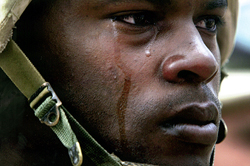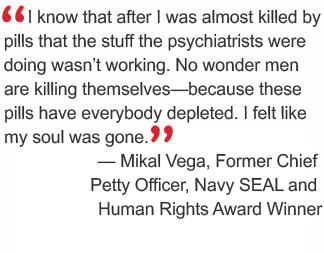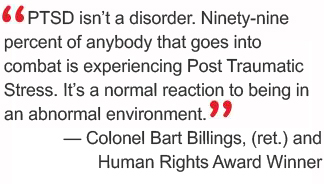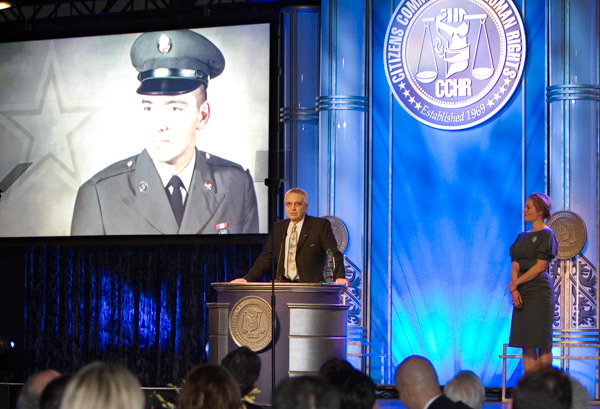By Kelly Patricia O’Meara
February 11, 2014
In the wake of an epidemic of suicides among military personnel, retired Chief Petty Officer, Navy SEAL, Mikal Vega and retired Army Colonel and psychologist, Bart Billings don’t believe that “taking care of their own” ends on the battlefield and are courageously speaking out about the harm caused by the mass drugging of service men and women.
Watch Mikal Vega’s award presentation
Coinciding with the mental health watchdog, Citizens Commission on Human Rights’ (CCHR) release of their documentary, The Hidden Enemy, which reveals in great detail psychiatry’s infiltration and abuse of military forces, CCHR honored Vega and Billings during its 45th Anniversary and Human Rights Awards Banquet on February 1st, in Los Angeles.
Vega and Billings were being honored for their advocacy on behalf of their brothers-in-arms who have experienced psychiatric abuses in the military. Each, in his own way, has gone above and beyond the call of duty, carrying the battlefield mantra of “no man is left behind” to the home front.
 One in six American service members is on at least one psychiatric drug and between 2005-2011, the U.S. Department of Defense increased their prescription of psychiatric drugs by nearly seven times. That’s more than thirty times faster than the civilian rate. Last year, more service members died by suicide than in combat and 22 veterans are killing themselves every day.
One in six American service members is on at least one psychiatric drug and between 2005-2011, the U.S. Department of Defense increased their prescription of psychiatric drugs by nearly seven times. That’s more than thirty times faster than the civilian rate. Last year, more service members died by suicide than in combat and 22 veterans are killing themselves every day.
Both of the award recipients are intimately familiar with the devastating rate of drugging going on in the military under the guise of “treatment.”
Retired Chief Petty Officer, Navy SEAL and twice awarded the Bronze Star with Valor, Mikal Vega had literally been to hell and back. Having survived missions in Iraq, Haiti, Bosnia, Kosovo, Zaire and Albania, Vega was indestructible until, as he says, “After 22 years of kicking death’s ass, it was a cocktail of pills that nearly took me out.”
Vega is referring to the psychiatric drugs he was prescribed as “treatment” upon returning home and the personal battle he faced in withdrawing from such drugs as Adderall and Prozac. Having weaned himself off the numerous and often addictive mind-altering drugs, Vega vowed to help other service personnel going through a similar drug hell.
 “I know,” said Vega, “that after I was almost killed by pills that the stuff the psychiatrists were doing wasn’t working. No wonder men are killing themselves—because these pills have everybody depleted. I felt like my soul was gone.”
“I know,” said Vega, “that after I was almost killed by pills that the stuff the psychiatrists were doing wasn’t working. No wonder men are killing themselves—because these pills have everybody depleted. I felt like my soul was gone.”
Vega has no illusions about the harm psychiatry is perpetrating upon the military: “The psychiatry and the pharmacology that they irresponsibly exact upon our military is a direct subversion of what their true power is. That they’re taking away, pill by pill.”
Vega’s personal dedication to helping others is manifested in his launch of a non-profit organization called “Vital Warrior,” set up to help other veterans without the use of stigmatizing psychiatric labels or harmful mind-altering drugs.
Watch Bart Billings’ award presentation
Retired Army Colonel and psychologist, Bart Billings, is no less passionate about the harm being inflicted upon the nation’s military. As one of the first professionals to disclose the link between psychotropic drug use and military suicides, Billings founded an annual International Military and Civilian Combat Stress Conference to promote effective, integrative, alternative and individual treatment approaches without the use of harmful psychiatric drugs.
Today’s military is being drugged at epidemic rates for Post Traumatic Stress Disorder (PTSD) which according to Billings is not a disorder at all. “PTSD isn’t a disorder,” said Billings. “Ninety-nine percent of anybody that goes into combat is experiencing Post Traumatic Stress. It’s a normal reaction to being in an abnormal environment.”
 “You shouldn’t really be medicating them,” Billings stated, “because they have a normal brain and once you medicate these people, what happens is it’s much, much harder to work with them because now you’re working with somebody whose brain functioning is chemically, physiologically changed by the medications.”
“You shouldn’t really be medicating them,” Billings stated, “because they have a normal brain and once you medicate these people, what happens is it’s much, much harder to work with them because now you’re working with somebody whose brain functioning is chemically, physiologically changed by the medications.”
Billings believes that the best mental health is found in a strong sense of involvement and caring, which leads to trust. Billings said, “In my 47 years of treating people, although I had access to using psychiatric medication, I never recommended a single psychiatric drug. In all these years, I can state unequivocally, I therefore never had a person commit suicide or a homicide while in my care.”
The problem is, explained Billings, “As long as psychiatry’s in-charge of mental health in the military, you’re not going to see much change. Because they feel obligated to medicate people.”
Together Billings and Vega have shown that there is a better, more humane, way to treat our returning warriors and veterans.
–
Kelly Patricia O’Meara is an award-winning former investigative reporter for the Washington Times’ Insight Magazine, penning dozens of articles exposing the fraud of psychiatric diagnosis and the dangers of the psychiatric drugs—including her ground-breaking 1999 cover story, “Guns & Doses,” exposing the link between psychiatric drugs and acts of senseless violence. She is also the author of the highly acclaimed book, Psyched Out: How Psychiatry Sells Mental Illness and Pushes Pills that Kill. Prior to working as an investigative journalist, O’Meara spent sixteen years on Capitol Hill as a congressional staffer to four Members of Congress. She holds a B.S. in Political Science from the University of Maryland.



